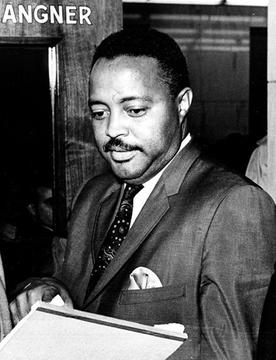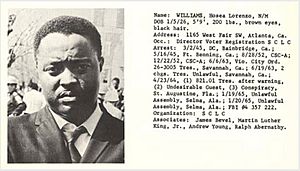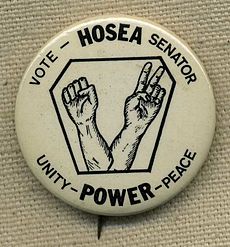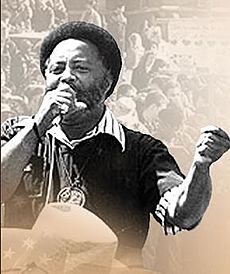Hosea Williams facts for kids
Quick facts for kids
Hosea Williams
|
|
|---|---|

Williams in 1966
|
|
| Born |
Hosea Lorenzo Williams
January 5, 1926 Attapulgus, Georgia, U.S.
|
| Died | November 16, 2000 (aged 74) Atlanta, Georgia, U.S.
|
| Resting place | Lincoln Cemetery (Atlanta, Georgia). |
| Occupation |
|
| Years active | 1956–2000 |
| Known for | Activist during the civil rights movement |
| Spouse(s) | Juanita Terry Williams |
| Children | Elisabeth Omilami |
| Family | Porsha Williams (granddaughter) |
Hosea Lorenzo Williams (born January 5, 1926 – died November 16, 2000) was an important American leader. He was a civil rights activist, a minister, and a businessman. He also worked as a scientist and politician.
Williams was a trusted friend of Martin Luther King Jr., who won the Nobel Peace Prize. King relied on Williams to help organize many peaceful protests. These protests fought against unfair treatment based on race, and for equal rights for everyone. King sometimes called Williams his "bull in a china closet" because he was so strong and determined.
After King's death, Williams continued his work. He started a large organization called Hosea Feed the Hungry and Homeless. This group helps many people in need. His famous saying was "Unbought and Unbossed."
Contents
Hosea Williams: A Civil Rights Hero
Early Life and Challenges
Hosea Williams was born in Attapulgus, Georgia, a small town in Georgia. His mother died when he was 10 years old. He and his older sister were raised by their grandparents. When he was 13, he had to leave town because of false accusations.
Williams served in the United States Army during World War II. He was part of an all-African-American unit. He was the only survivor of a bombing and received a Purple Heart medal. When he returned home, he was badly beaten for drinking from a "Whites Only" water fountain. This happened even though he had just fought for his country.
After the war, Williams worked hard to get an education. He earned a high school diploma when he was 23. Then, he got two degrees in chemistry from colleges in Atlanta. He later worked as a chemist for the U.S. government. He also started several chemical companies.
Fighting for Civil Rights
Williams first joined the NAACP. Later, he became a key leader in the SCLC. This group included Martin Luther King Jr., Ralph Abernathy, and John Lewis.
He helped organize important protests in Florida. These actions helped lead to the Civil Rights Act of 1964. This law made it illegal to treat people differently based on their race.
In 1965, Williams played a big part in the Selma to Montgomery marches. On March 7, 1965, known as "Bloody Sunday", Williams and John Lewis led over 600 marchers. As they crossed the Edmund Pettus Bridge in Selma, Alabama, police attacked them. They used tear gas and beat the peaceful demonstrators. This terrible event helped lead to the Voting Rights Act of 1965. This law protected the right of all citizens to vote.
A Life in Politics
Hosea Williams also had a career in politics. In 1974, he was elected to the Georgia State Senate. He served there for five terms, until 1984.
Later, he was elected to the Atlanta City Council. He served on the council for five years. In 1989, he ran for Mayor of Atlanta. He also served on the DeKalb County, Georgia County Commission.
In 1987, Williams led a "March Against Fear and Intimidation" in Forsyth County, Georgia. This county had no non-white residents at the time. Marchers were attacked by counter-protesters. The next week, 20,000 people, including many civil rights leaders, marched to support them. After this, Forsyth County slowly became more diverse.
Helping Others
In 1971, Hosea Williams started a non-profit organization. It is called Hosea Feed the Hungry and Homeless. This group is famous in Atlanta for helping people in need. Every year, they provide hot meals, haircuts, and clothing. They do this on holidays like Thanksgiving, Christmas, Martin Luther King Jr. Day, and Easter Sunday. Williams' daughter, Elisabeth Omilami, now leads the foundation.
Family and Legacy
Hosea Williams married Juanita Terry Williams in 1951. They had eight children together.
Hosea Williams passed away on November 16, 2000, after battling cancer. His funeral was held at the historic Ebenezer Baptist Church in Atlanta. This was the same church where Martin Luther King Jr. was once a pastor. Williams is buried in Lincoln Cemetery.
To honor him, a street in Atlanta was renamed Hosea L Williams Drive. His daughter also keeps a traveling exhibit of civil rights items. Hosea Williams was played by actor Wendell Pierce in the 2014 movie Selma.
See also
- List of civil rights leaders
- List of members of the American Legion
 | Aaron Henry |
 | T. R. M. Howard |
 | Jesse Jackson |




